In 2008 or 2009, the BBC made a documentary on life inside Libya: I remember it because I watched it at the time of its broadcast. Up until the beginning of 2011, that video was available on You Tube.
Once the international community had made up its mind – after years of back and forth – that Gaddafi was ‘evil’ and a war had to be waged on Libya, all versions of the documentary were removed from the web.
The documentary, as I recall it, was a reasonable, even-handed (even positive at times) evaluation of Gaddafi’s government, life inside Libya and the state of the nation. It reflected the new light Libya was being viewed in after years of being regarded as a ‘pariah state’ by the West.
I was looking for it once the horrific 2011 crisis had begun and it was gone.
In its place, the BBC has instead shown a Storyville documentary called ‘Mad Dog: Gaddafi’s Secret World’; which is quite clearly an attempt to firmly rewrite history and cement the image of Gaddafi as a mad dictator and his Libya as an oppressive, ‘terror’ state. Christopher Olgiati’s documentary (also shown on Showtime in the US), though it does draw upon some factual information in parts, is mostly mind-numbingly false propagandising aimed at justifying the destruction of Libya in 2011 for the sake of both our governments and our major media – organisations that have every reason to take this route after the frankly appalling falsehoods it helped propagate about the Libya crisis of 2011 (for one thing, the BBC had aired protest footage from India and presented it as footage of anti-government protests in Libya).
The documentary was full of unverifiable claims about Gaddafi’s behaviour, unsubstantiated rumours about some of his crimes, and a generally one-sided, pre-fabricated depiction of life inside the former Libya, as well as Gaddafi’s influence on Africa, which the programme depicts as entirely negative (others of course called Gaddafi Africa’s ‘last hope’).
It used entirely subjective, emotive and unsubstantiated narratives, cited mostly unverifiable sources, and played menacing, ‘villain’ music in the background accompanied by ominous close-ups of Gaddafi’s face just to hammer home the point that ‘this is the Bad Guy’.
Lacking all journalistic merit or integrity, it is a fitting demonstration of just how bad, how manipulative, propagandist filmmakers get when making supposedly ‘sober’ films.
It’s not a crime that the BBC broadcast it; but let’s remember this is the same BBC, of course, that kept serial sex-offender, paedophile, necrophiliac and ‘child procurer’ for the rich and famous, Jimmy Saville, gainfully employed for so many years: and we haven’t had a documentary about *that* yet.
But the fact that an obviously strategic documentary like that was being put out by the BBC only served to remind me of why it’s important and necessary to continue to counter that narrative and try to re-establish some reality and perspective concerning Gaddafi and what his Libya was really like; before it was wiped from the face of the earth in 2011.
They told us it was a terrible place, ruled over by a horrible tyrant.
A place where people were oppressed and mistreated. While there were some elements of truth to that view (to a certain extent), much of it seems to have been largely a fiction maintained by the corporate-owned media and by the corporate-owned politicians of our governments; all of which, as you will see, served a long-term purpose.
This article then is a study of Gaddafi’s Libya, dealing with the successes of the country, its failures and the reasons for those failures, as well as assessing the reality (or otherwise) of some of the popular perception, demonisation and portrayal of this now-extinct Libyan society…
In 1951 Libya was the poorest country in Africa and one of the poorest in the world.
By 2011, after four decades under Gaddafi’s stewardship, it was the most successful nation in Africa and was acknowledged by the UN to have a higher rate of development than even countries like Russia, Brazil and India. Among many other academics who were willing to voice a more considered view of the North-African nation, a Professor Garikai Chengu, a scholar of Middle Eastern affairs at Harvard University, wrote; “In 1967, Colonel Gaddafi inherited one of the poorest nations in Africa; however, by the time he was assassinated, Gaddafi had turned Libya into Africa’s wealthiest nation. Libya had the highest GDP per capita and life expectancy on the African continent. Less people lived below the poverty line than in the Netherlands.”
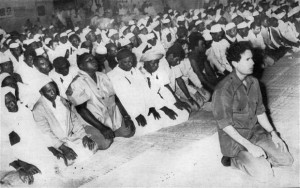
The UN’s Human Development Index report from 2010 – less than a year before the 2011 collapse of Libya – cited Libya as No.1 on its index for rate and scale of development.
Unlike in most other oil-rich Arab countries favoured by the Western governments, there wasn’t a big disparity between rich and poor, wasn’t a big class division, there were no ghettoes and there was no homelessness. In Gaddafi’s system, housing, healthcare, education and living allowances were not commodities or privileges, but human rights. Unlike the Gulf States or Saudi Arabia, for example, there was a heavy emphasis on the oil wealth being distributed among the people, so that the population could be direct beneficiaries from Libya’s oil exports. There was also an emphasis on that oil wealth being spent only for productive purposes, building infrastructure, building cities, houses and apartment buildings.
Under the Gaddafi-led revolution, Libya had essentially created its own interest-free money, the Libyan Dinar, which was used productively and purely for economic growth, infrastructure-building and the welfare of the people, and not for speculation, profits or bonuses for bankers.
Gaddafi had in essence created a self-reliant, moral economy; ‘bankers’, in the sense that we in the West understand the term, didn’t exist in this Libya. The expansion of this Gaddafi/Libyan model into more of Africa could potentially have revolutionised economic and social development across African nations and could have made Africa far more self-sufficient, freeing it of what Malcolm X had called the global Apartheid against African development.
In 1969, Gaddafi had vowed to house every Libyan before even his own parents; he kept this promise and his father died before he was able to be housed. But every Libyan was housed. 40% of the population had lived in shanties, tents or caves prior to Gaddafi and the 1969 revolution. The country he and the revolutionaries took over in 1969 was barely a generation beyond the brutal Italian colonial occupation of Libya in World War II, in which over a million Libyans had died in concentration camps.
And a broadly secular society had been imposed in Libya following the entirely bloodless and non-violent 1969 ousting of the old Colonial-backed monarchy; one which championed the rights and status of women, one in which massive social reforms and welfare programs drastically raised the quality of life, life-expectancy, education, even literacy.
It’s also important to understand that although Islam certainly remained a significant part of this Libyan culture and day-to-day life, this was to a far lesser extent that in other Arab countries. In fact, if there were two primary things Gaddafi and the Libyan ‘Jamahariya’ wanted to ensure the country and the society against, it was (1) a return to Colonial/Imperialist domination via Western style Capitalist interests and (2) the influence of religious fundamentalists; both of which were of course serviced by the NATO-led 2011 criminal conspiracy – that was the point, of course.
A January 2011 report of the UN Human Rights Council (read PDF here), released just a month before the horrific 2011 crisis began, praised aspects of the country’s human rights record, particularly the status of women in the country, while also citing improvements in other areas. It said Gaddafi’s government protected “not only political rights, but also economic, educational, social and cultural rights.” It also lauded his treatment of religious minorities and the “human rights training” of its security forces.
Let’s reiterate: this was *less than a month* before the crisis began and less than a month before Western government officials were calling Gaddafi ‘a brutal tyrant killing his own people’.
Also in 2011, again literally just weeks before the crisis began, Gaddafi was frontrunner for Amnesty International USA‘s online poll for ‘Human Rights Hero, 2011’; you might think I’m making that up, but I’m not. Not only was he nominated, but he was winning the poll by some distance (look it up, if you don’t believe me).
It simply demonstrates how big a gulf there is between popular, mass-media perception and actual reality; because, again, within weeks of Gaddafi being considered a ‘Human Rights Hero’, he was being labelled a ‘brutal tyrant’, who had “lost all legitimacy” and “had to go”.
Someone was simply rewriting the script on short notice, changing the narrative overnight.

So how ‘terrible’ was this Libya that had existed for the four decades since the original revolution?
According to David Blundy and Andrew Lycett’s book titled, “Qaddafi and the Libyan Revolution”, published long before the 2011 crisis; “The young people are well dressed, well fed and well educated. Every Libyan gets free and often excellent education, medical and health services. New colleges and hospitals are impressive by any international standard.”
They further state, “All Libyans have a house or a flat, a car, and most have televisions and other conveniences. Compared with most citizens of Third World countries, and with many (others), Libyans have it very good indeed.”
These essentially were the same conclusions drawn by that earlier BBC documentary I talked about, which was erased without trace once the 2011 crisis was underway.
Again, it was a broadly secular society that had been established after Gaddafi and his revolutionary allies had ousted King Idris in their entirely bloodless coup in 1969. Child marriage was banned and women enjoyed equality of equal pay for equal work (an astonishing reform for an Arab nation at that time), equal rights in divorce and access to higher education. For that matter, enjoyment of higher education rose from 8% in 1966 to 43% in 1996, with literacy rates rising from 25% before Gaddafi to an estimated 88% during his era, and average life-expectancy rose from 51/54 in 1969 to 74/77.
How did this happen?
From 1973 to 1977, Gaddafi had embarked upon the “remaking of Libyan society”, as laid out in his ideological visions. This was put into practice formally beginning in 1973 with a so-called ‘Cultural’ or ‘Popular Revolution’. This revolution was designed to combat bureaucratic inefficiency, lack of public interest and participation in the sub-national governmental system, and the problems of national political coordination. In an attempt to politicise and mobilise the population, Gaddafi urged them to challenge traditional authority and to take over and run government organs themselves. The instrument for doing this was the People’s Committee. Within a few months, such committees were found all across Libya.
Functionally and geographically based, they eventually became responsible for local and regional administration.
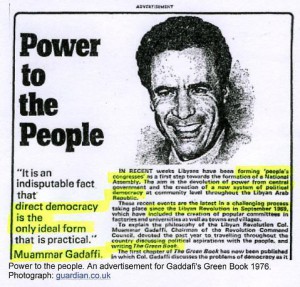
This was apparently the real-world application of Gaddafi’s “Direct Democracy” model that he had put forward as the alternative to Parliamentary or Representative Democracies, which he viewed as both inefficient and corrupt.
While mainstream Western critics tended to either avoid all discussion of the political system Gaddafi instituted in Libya or to regard it as some quaint novelty, numerous academics and progressives were happy to acknowledge that this system of ‘Direct Democracy’ offered a serious alternative model and solution for Africa and other parts of the ‘Third World’, where multi-party ‘democracy’ has been broadly been a failure, resulting in ethnic and tribal conflicts, vast corruption and general political chaos.
In Libya, Gaddafi’s unique, highly customised form of Socialism not only worked, but it was utterly and radically transformative.
Hugh Roberts, former director of the International Crisis Group’s North Africa Project, points out in his analysis of Libya, ‘Gaddafi’s ideas of Direct Democracy over representative or parliamentary democracy in fact resonate somewhat with some of the ‘utopian’ ideas of radical ‘Leftist’ thinkers of the 1960s in the West.’
So again, how ‘terrible’ was this Libya that Gaddafi had inspired and led?
Let’s take stock of a few basic facts about this ‘pariah state’ that was so demonised by the West for so long;
- There was no interest on loans. Banks in Libya were state-owned and loans given to all citizens were at zero-percent interest by law. Unlike every country in the West, Libya was built and maintained on interest-free money.
- Libya had no external debt to any foreign nation, entity or institution, as it had done everything independently and on its own merit. Consequently, no Libyan had any personal debt either.
- There was no electricity bill in Libya; electricity was free for all citizens.
- Having a home was considered a basic human right in Libya. Everyone was housed.
- All education and all medical treatments were free in Libya.
- The welfare system – a novelty in itself in Africa and most of the Arab world – was incredibly generous. Libyan Unemployment benefit was equivalent to $750.
- Libyans who could not find the education or the medical help they needed in Libya, were fully funded by the government to go abroad to seek what they needed, with everything – travel, accommodation, living allowances – paid for by the state. There were therefore many Libyans in foreign countries for their education or for medical help, all paid for.
- If a young Libyan was unable to find employment after graduation, the state would pay them the average salary of the profession until they could acquire a paying job in that field. Speaking of education, a country that only had a 25% literacy rate before Gaddafi’s revolution had 25% of its citizens attaining a university degree by the time of the uprising.
- Any mother who gave birth to a child received the equivalent of $5,000.
- All newlyweds received 60,000 dinars (equivalent to $50,000) from the government to buy their first apartment and to help start a family.
- Any Libyans who wanted to take up farming careers would receive farming land, a house, farming equipment, seeds and livestock to get started. All of it free.
- Anyone looking to buy a car could ask the government to subsidize 50% of the cost.
- The price of petrol in Libya was $0.14 per litre.
- Due to one of Gaddafi’s relatively late reforms, a portion of every Libyan oil sale was being credited directly to the bank accounts of all Libyan citizens; this was envisioned as a true ‘sharing of the wealth’ among the population.
–
Gaddafi’s ‘Green Book’, which provided much of the basis for his ‘remaking of Libya’, is also something that was largely white-washed from the narrative in the West, covered up by all the carefully measured coverage of the ‘brutal regime’ and ‘terrible dictatorship’.
It has at other times been ridiculed by Western commentators or dismissed as the quaint ramblings of a ‘madman’ or an eccentric. But numerous progressive academics worldwide have defended The Green Book as a serious body of political thought, offering an incisive critique of Western parliamentary democracy, capitalism and Marxist socialism, and offering a viable, workable alternative. Combined with the model of Direct Democracy, it transformed Libya and could have – in theory – transformed much of Africa the same way had Gaddafi’s Pan-African goals been allowed to develop further (which they were on the brink of doing prior to the 2011 NATO/Al-Qaeda ‘intervention’).
A (very) quick snippet from The Green Book reveals some of its essential character;
- ‘All individuals have a natural right to self-expression by any means…’
- ‘No person may own a private means of transportation for the purpose of renting (it) to others, because this represents controlling the needs of others.’
- ‘No representation of the people – representation is a falsehood. The existence of parliaments underlies the absence of the people, for democracy can only exist with the presence of the people and not in the presence of representatives of the people.’
- ‘The house is a basic need of both the individual and the family, therefore it should not be owned by others.’
–
While some of the ideas laid out in The Green Book are at times scattered and even naive, and while they certainly wouldn’t work in every society, they were primarily formulated for the specific needs of Libya and the Third World; and in that respect, they can’t be dismissed at all. Later suggestions (by Gaddafi himself) that the ideas could be used to solve the problems of the whole world were probably over-optimistic and probably motivated more than a little by ego; but, again, in certain societies in the world (particularly Africa), Gaddafi’s ideas could accomplish a great deal.
All of that is just a quick overview of Libya before the externally-generated 2011 bloodbath; a ‘terrible’ ‘pariah’ state ruled by a ‘brutal regime’, we’re told. And of course all of that is gone now, destroyed in the orchestrated chaos and bloodshed of 2011 and beyond. Western government officials and the corporate media of course don’t want you to know that; and they certainly made sure we didn’t think about that during the 2011 crisis.
By all means, do further research of your own on the subject. The point is that this country, this society, doesn’t exist anymore.
The conspiracy of 2011, conducted by NATO, Al-Qaeda, and the various mercenaries and jihadists, made sure of that (see ‘The Libya Conspiracy’ here for the full book on that subject).
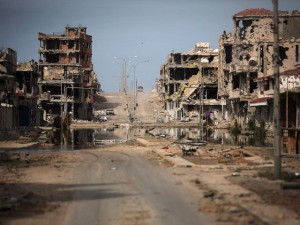
What exists in its place now is… nothing. Just rampant criminality, unending warfare, terrorists roaming the Libyan cities in tanks and convoys… and no government.
One of the first things that was done when the West imposed new sanctions on Libya during the uprising was the freezing of the country’s oil-wealth distribution programme; Gaddafi’s state-run welfare program for low-income families, the elderly and disabled, through which they were provided with 500 Libyan dinars of welfare per month.
International powers with corporate interests were fully intent on the destruction of this society for decades; the entire system had to be crippled or broken down in order to destabilise the society; this process was going on since as far back as the 1980s, as will be demonstrated in a moment.
What Libyans now have in its place is a country of destroyed infrastructure, routine mass killings, Al-Qaeda control of vast territories, Islamic State ’emirates’, religious persecution of minorities, violent oppression of women, the list goes on.
This result wasn’t a mere ‘oversight’, but was the desired outcome of the international criminal conspirators all along – to destroy Gaddafi’s Libya and erase it from history.
_________________________
The Libyan political system – a system that no one in the media or foreign governments appeared to understand during the 2011 crisis (as evident in the horrible BBC/ABC interview with Gaddafi in February 2011 at the beginning of the crisis) – was a ‘participatory democracy’ as opposed to a ‘representative’ or parliamentary democracy or the system of party politics that defines most Western democracies; in this system, the masses rule the state.
Through this ‘State of the Masses’, as Gaddafi called it, hundreds of ‘People’s Congresses’, made up of citizens or tribal figures of every part of the country, would meet to discuss various affairs and to guide government.
Gaddafi admitted this system wasn’t in practise always perfect, but maintained -rightly or wrongly – that it was more “democratic” than the Western model of democracy and more humanistic than the systems of Capitalism or Communism that were opposing each other on the world stage for the decades during which Gaddafi was creating his vision for Libya. Tellingly, during the very first orchestrated outbreaks of violence in 2011, the buildings for the People’s Congresses in Benghazi were one of the first targets attacked and burnt to the ground by the rioters.
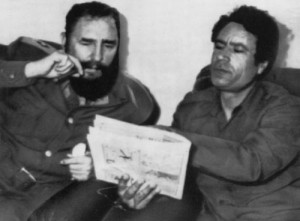
Gaddafi’s vision for Libya and the transformation of the society was an ongoing process, occurring in phases and not just limited those early years after the 1969 coup. The idea was always to continuously look to adjust things and make reforms to meet the changing needs of the society and the population. Gaddafi’s interest wasn’t just in creating and sustaining a high quality of life for the population, but in making the society self-sustaining, entirely independent and creating a national pride and sense of identity.
He and his supporters didn’t want Libyans to view themselves as just another ‘Third World’ country, nor to remain just another Colonial puppet in Africa, but to transform themselves into a society to be proud of and an identity to be proud of. That meant building and modernising; but it meant also keeping the country free of foreign control, particularly Colonialist control, and what this also meant was keeping the country free from the predatory bankers and financial institutions that control and dominate Western societies and from the debt-slavery that the IMF, the World Bank, etc.
In attaining this self-sufficiency and independence, Libya had remained essentially its own self-controlling entity, almost cordoned off from the rest of the world.
In September 1973, it had been announced that all foreign oil producers active in Libya were to be nationalised. For Gaddafi, this was an important step towards the type of customised socialism he wanted. It was an economic success; while gross domestic product had been estimated at $3.8 billion in 1969 when Gaddafi had ousted the King, it had risen to $13.7 billion in 1974, and $24.5 billion by 1979.
As a direct result, the standard of living for Libyans drastically improved over the first decade of Gaddafi’s administration. In fact by 1979, the average per-capita income for Libyans was at $8,170 – this being compared to $40 in 1951: this was in fact above the average for many modern, fully industrialised societies, including Britain.


And this, keep in mind, was all within less than a decade of Libya having been a poor, ‘Third World’ country under Colonial control.
Through the Green Revolution, farming was spread into the desert, turning the once arid wastelands green, and Gaddafi pursued a long-term programme to make Libya entirely self-sufficient in food production; in other words to make it non-dependent on foreign food imports. And of course Gadaffi invested in the building of those vast pipelines through the desert that were eventually able to bring some 2 million kubic metres of fresh water to populations per day; this was the ‘Great Man-Made River’ – which would’ve been one of the Gaddafi era’s abiding legacies in both Libya and Africa.
This was the ‘modern marvel’ (called by Gaddafi, rather immodestly, the ‘eighth wonder of the world’) that the ‘rebels’ and the NATO bombers were directly bombing and destroying in 2011.
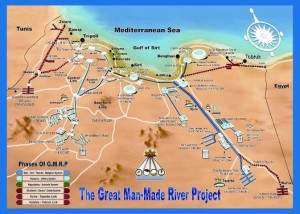
Again, the ‘system’ in Libya, which often very loose and ill-defined in many ways, was never set in stone for eternity; it was always an evolving, adapting thing, and Gaddafi was certainly open to a degree of reform. The late 1980s saw a series of liberalising economic reforms within Libya designed to cope with the decline in oil revenues that had occurred due to Western demonisation and sanctions.
In May 1987, Gaddafi had announced the start of the “Revolution within a Revolution”, which began with reforms to industry and agriculture and saw the re-opening of small business among other things.
While many critics portrayed the Gaddafi family and the Libyan ‘regime’ as an immovable, dictatorial ‘establishment’ that would permanently rule over the people, it is clear that Gaddafi was considering other possibilities. Even as late as January 2011, a WikiLeaks file passed onto The Telegraph indicated that Gaddafi was manoeuvring to allow for fully democratic elections, including for a possible ‘Prime Minister’ position. This was published on 31st January 2011, just a fortnight before the foreign-orchestrated ‘Civil War’ began.
It is also likely that, given his age and the fact that he wouldn’t be around forever, Gaddafi was aware of the need for measures to be taken to prevent corrupt figures and alliances from taking over government or hijacking the ‘revolution’, particularly after he was gone. This may in fact have been one reason why a number of Libyan politicians moved against him in 2011, facilitating the NATO intervention. If we examine the make-up of the ‘National Transitional Council’ that the Western governments put into power in 2011, it’s worth noting that a number of the most influential movers in the NTC were specifically members of the old government who had personal grudges with Gaddafi or personal reasons to want Gaddafi gone.
For example, by February 2009 Gaddafi was asking for public support to distribute Libya‘s oil wealth directly into the bank accounts of the population. However, senior officials feared losing their jobs “due to a parallel plan by Gaddafi to rid the state of corruption.”
“As long as money is administered by a government body, there would be theft and corruption,” Gaddafi had said, recognising the need to safeguard the public welfare against the behaviour of self-serving officials. This initiative was being reported by, among others, the BBC prior to the beginning of the uprising in February.
This prompted an unusually open airing of dissent from top government officials, who said the plan would wreak havoc in the economy. And Gaddafi himself warned Libyans that the scheme, which promised up to 30,000 dinars ($23,000) a year to about a million of Libya’s poorest citizens, would cause chaos before it brought about prosperity. This move by Gaddafi was openly reported in international media in the weeks prior to the 2011 uprising. Reuters, for example, reported, ‘Hundreds of thousands of Libyans gathered on Wednesday to discuss the proposal by their leader Muammar Gaddafi to disband the government and allow the country’s oil wealth to flow straight to the people.‘
Gaddafi was calling on the people to back his plans to dismantle the minimal government apparatus and go ahead with the oil-wealth redistribution plan instead of having it go through middlemen with their own interests. As in all governments there were some dodgy individuals with dubious interests; Mustafa Mohamed Abud Ajleil and Mahmood Jibril, for example, were known corrupt individuals within the government and both were among the first to defect to the side of the rebels and the NTC, largely because they were exactly the kind of officials Gaddafi was planning to undermine. These then were many of the ‘representatives’ of Libya that Western governments were empowering to lead and guide the international perception of the situation.
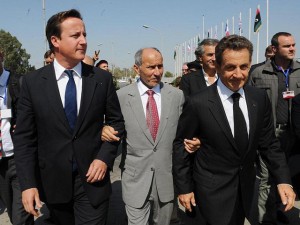
In general, it could be argued that most of those maneuvering against Gaddafi and the Libyan system were those with discernible personal agendas. Aside from the armed rebels and their commanders, most of this ‘government’ was presumably made up of willing stooges for foreign corporate interests who were probably bought off in return for helping facilitate the corporate/Colonial operation.
Others were a mixture of people who defected from the existing Libyan government when they saw which way the wind was blowing.
For example, Muhammad as-Senussi, son of the former Crown Prince and grand-nephew of the late King Idris (who Gaddafi and his revolutionary allies ousted from power in 1969), was one of the most vocal advocates for foreign intervention and condemnation of Gaddafi and the government during the crisis, and was flown to various locations, including to address the European Parliament, to evangelise for the rebels’ cause. A rival claimant to the throne, Idris bin Abdullah al-Senussi, announced in an interview that he was ready to return to Libya and “assume leadership” (restore the old monarchy?) once the change had been initiated.
These weren’t objective, impartial voices, but people with an obvious agenda and an obvious grudge against Gaddafi being allowed to steer part of the discourse abroad.
For the record, the former Libyan monarchy had essentially been a European/Colonial-installed puppet regime that served Western/corporate interests and had kept the population in poverty. Of course, I wouldn’t suggest that every single person involved in the rebellion or the NTC was a NATO puppet, a stooge for foreign corporations or an Islamist extremist; no doubt, some of them were simply people who wanted change and many others were no doubt people simply swept along in the tide.
And further to all of this (and much after the fact), lead NTC official Mustafa Abdul Jalil has admitted that he knew at the time that Gaddafi hadn’t given anyone any order to fire on civilians in Benghazi (the allegation that was the basis for the 2011 UN Resolution and NATO intervention), but that he had gone along with the lie for the sake of having Gaddafi toppled.
He also admits that it wasn’t Libyan security forces that fired those first shots against protesters back in February 2011, but foreign intelligence operatives – and furthermore that he had been briefed in advance that it was going to happen. In essence he was admitting that the entire Libyan ‘crisis’ and ‘intervention’ was a staged crisis orchestrated from the outside.
And yet the media is absolutely silent about this admission, of course.
Gaddafi’s eldest son, Saif al-Islam, was seen for years as the liberal, progressive face of the Libyan establishment and as the figure who would help transition the country carefully towards full democracy and more liberal values. He was never given the chance to do fulfil that potential; as once the government was under such ferocious, bloody assault in 2011, he could never abandon his father. The case can convincingly be made that Saif and not the Western backed NTC may have been the country’s best chance for progression and democracy; a gradual, organic process conducted over time instead of via armed, bloody chaos. The 38-year-old, with an MBA from Vienna University and a PhD from the London School of Economics (LSE) and the manager of the Gaddafi International Charity and Development Foundation, was suddenly now (in 2011) wanted by the International Criminal Court for ‘crimes against humanity’.
It was a farce, bringing the International Criminal Court itself into great disrepute, as the ICC in 2011 had become simply an appendage of NATO and the UN Security Council.
Prior to 2011, Saif spoken at length both inside Libya and abroad about how he wanted democracy in the country and wanted to introduce more and more liberal ideas into the society, but he had wisely and realistically maintained that this process would need to take place over a period of time.
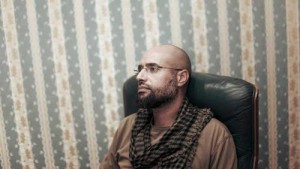
All the indications were, however, that Muammar Gaddafi was entirely open to the more Western-influenced Saif gradually coming through into Libyan politics and helping guide the transition. Western policy makers and politicians would’ve been perfectly aware of this and aware of the reforms being planned or implemented in Libya even at this late stage of Gaddafi’s life.
For one thing, because Western politicians had had plenty of dealings and interactions with the Libyan officials, particularly Saif, and there had seemed to be an understanding that Libya was moving forward and that Saif was the key to this process. Instead the one-time ‘golden prince’ and reformer has just been sentenced to death by firing squad by one of the armed militias imported into Libya by French, British and American governments.
Saif in fact openly criticised the Libyan ‘regime’, just as his father often did: what our government officials and media constantly failed to recognise (or perhaps more accurately, what they didn’t want *us* to recognise) was that Gaddafi wasn’t ‘the regime’. From 1977 onward, he had in fact given up all formal positions and adopted a highly customised symbolic position in the delicate Libyan society.
This was why Gaddafi himself frequently criticised ‘the government’ and ‘the regime’ – because he didn’t consider himself part of it, strictly speaking, and this was even more the case with Saif al-Islam, who openly said that what Libya needed was “democracy”. This same attitude was echoed by one of Gaddafi’s other sons, Saadi (who at one time was signed by Italian football club Bari), and who said Libya had to move towards democracy, but that his father was the one who could steer that transition.
These reforms implied a shift towards constitutional government, the most notable elements being Gaddafi’s proposals for the codification of citizens’ rights and punishable crimes, which were meant to put an end to arbitrary arrests (which had been one of the major problems with the Revolutionary Committees, which had certainly acted in excess at various points and were the biggest cause of resentment from much of the Libyan population).
________________________
With the benefit of hindsight, we might now speculate that the forces of the international community didn’t *want* Libya to progress or to evolve towards more orthodox democracy.
Why? Because at both key points where that kind of direction might’ve been occurring, the actions of Western governments – particularly the US – ensured it couldn’t happen.
Those two ‘key points’ were in the late 1980s and then in the years leading to 2011.
In the late 80s, at a point where Gaddafi was trying to limit the powers and activities of the Revolutionary Committees, this line of development was cut short by the imposition of international sanctions (in the wake of the Lockerbie bombing; which Libya almost certainly wasn’t guilty of). This created a state of national emergency that served to reinforce the regime’s more conservative elements and made Gaddafi’s intended reforms too ‘risky’. In a society that included political Islamists and radicals and various corrupt operators, the idea of opening up Libyan society to previously unknown degrees of political freedom at a time when the economy was suffering from the massive sanctions and the government was unable to maintain strong, well-equipped security forces, was just too dangerous (witness present-day Egypt and the suppression of the Muslim Brotherhood).
It would take roughly a decade after this before Gaddafi would feel safe enough to try again to push reforms.
It was only in 2003-4, after Libya had paid a massive sum in compensation to the Lockerbie families in 2002 (having already surrendered Abdelbaset Ali al-Megrahi and Al Amin Khalifa Fhima for trial in 1999), that the UN-imposed sanctions were finally lifted. At this point, a new movement towards reformation and democracy once again emerged, this time headed by Gaddafi’s son Saif al-Islam. As already demonstrated, this was the direction Libya was going in organically in the post-sanctions years, characterised by the country’s ‘rapprochement’ with the West.
Anyone who has studied the Libya situation knows that the country was moving towards more and more reforms, with a view to more orthodox democracy.
This coincided with that brief era in which Gaddafi and Libya were being ‘brought in from the cold’, as the media kept describing it; re-establishing relations with Western governments. This wasn’t just about business, although business was of course a central factor. The Western-educated Saif Gaddafi was regarded as the chief architect of Libya’s ‘rehabilitation’ and the driving force behind this push for reconciliation and a new era. It was all part of the plan to move towards greater democratic aspirations and to put an end to the idea both of Libya being a threat to the West and the West (particularly America) being a threat to Libya.
The problem, it would soon become clear, was that although the former was true, the latter obviously wasn’t.
The idea that the people and forces guiding the 2011 ‘uprising’ were a ‘peaceful, pro-democracy movement’ was of course a fiction carefully constructed and maintained by our officials and the media. Many of those doing the ‘rebelling’ in 2011 weren’t looking for ‘democracy’ or liberal reforms, but were of course radical Islamists/Salafists looking to establish Sharia-based Islamic ’emirates’, and many others were simply corrupt politicians looking to further their own interests or the interests of foreign, corporate sponsors with whom they had been heavily colluding (CIA, MI6, French and Qatari Intelligence included).
It is also a matter of fact that many of the leading figures in the 2011 anti-Gaddafi movement were not people living in Libya, but exiles who’d been living abroad for many years and had been colluding with Western officials and intelligence agencies during that time, some of them pro-Monarchists and some seeking lucrative personal profit from collusion with corporate interests.
The initial ‘Day of Rage’ in February 2011 that sparked off the entire ‘uprising’ wasn’t something organised by Libyans living in Libya, but had been organised from London, Washington and Paris.
Hugh Roberts, former director of the International Crisis Group’s North Africa Project, in this superb analysis shortly after Gaddafi’s death, poses the question of whether ‘what we have been witnessing is a revolution or a counter-revolution.‘ As he points out, the victorious rebels were ‘brandishing the old Libyan flag of the 1951-69 era’, and many of the protesters ‘identified their cause with the monarchy Gaddafi & Co overthrew.’
He writes elsewhere, ‘As the elites saw it, the 1969 coup had been carried out by ‘Bedouin’ – that is, country bumpkins. For Gaddafi & Co, the traditions of the urban elites offered no recipe for governing Libya: they would only perpetuate its disunity.’
________________________
Part of the reason also that the Revolutionary Committees and the commonly referenced ‘brutality’ of the ‘regime’ continued for so long was precisely *because* the Libyan system was under such existential threat from the outside (and from elements within). There’s no question that elements of the regime dealt very harshly with certain elements in the society and that abuses of power occurred at various points, that prisoners were mistreated in the notorious Abu Salim prison (although the reality of the notorious ‘Abu Salim massacre’ remains highly questionable to this day).
There’s no justification for torture anywhere; not in Libya (and there is far more torture in Libya now, by all accounts, that in pre-2011 Libya), not in Saudi Arabia or Iran, not all across Africa, not in Guantanamo Bay. But what the Western demonisation campaign did was to focus almost *solely* on this element of the regime, ignoring all the other aspects of the revolutionary Libya and everything else that had been accomplished. Virtually every state in the Arab world, and many in Africa, have those elements to the activities of their regimes: unfortunately it is common in that part of the world.
For the media and our officials to focus on and excessively highlight this unsavoury aspect of Libya and to try to portray this as the defining characteristic of the Libyan state was simply manipulative sleight-of-hand; it would be like citing Guantanamo Bay or institutionalised police brutality against African-Americans in the US as the defining characteristic of everything America stands for.
The point is also that the Revolutionary Committees had clearly deviated from the purposes that Gaddafi initially instituted them for; it’s questionable whether they were intended to be the oppressive instrument that they became. The Libyan Arab Jamahiriya issued the Great Green Document on Human Rights, in which Article 5 established laws that allowed greater freedom of expression. Article 8 of The Code on the Promotion of Freedom stated that “each citizen has the right to express his opinions and ideas openly in People’s Congresses and in all mass media.”
There is also the legitimate question of how culpable Gaddafi himself could be considered in the activities of those elements of the regime; that was a matter that different people viewed differently in Libya, some considering Gaddafi as separate from those regime elements and others blaming him personally for regime excesses. But it’s worth noting that Gaddafi himself distanced himself from the ‘regime’ and from the Revolutionary Committees from the early eighties onwards, and often criticised them openly when he was presented with reports on some of their excessive behaviour.
This confusion as to whether Gaddafi himself had any executive control over those elements of the ‘regime’ or not continued right into the 2011 crisis, where Gaddafi and his son Saif were being personally blamed by the West for alleged attacks by the army on protesters. In an interview with RT during the crisis, Saif insisted that neither he nor his father had been in control of the security forces and that no orders had been issued to fire on protesters. Saif reaffirmed the claim made by his father for years that the military and security forces were under their own chain of command and didn’t take orders from Gaddafi. When asked who ordered the soldiers to fire, Saif explained, “Nobody. Nobody ordered: they simply opened fire, that’s it. They don’t need permission to defend their barracks from armed attack…”
_________________________
The downfall of this Gaddafi-inspired Libya was of course on the agenda of certain Western governments and corporations for a long time.
What occurred in 2011 was made to look like something that unfolded suddenly in the midst of the ‘Arab Spring’, but in actual fact something of that sort was being orchestrated long before. The international forces, led by international financial predators, were never going to allow Gaddafi to keep his little ‘Socialist island’, if you will, safely to one side of the vast Landmass of the International Corporataucracy. Mr Roberts talks about the Libyan ‘elites’; well, we have our own ruling ‘elites’ in our nations too, and indeed the world itself has a ‘global elite’ that ultimately doesn’t tolerate big-headed Bedouin ‘bumpkins’, as Roberts put it, coming along and maintaining an independent nation free from its all-encompassing financial control.
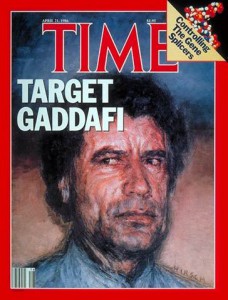
This enmity between the Libyan Revolution and the West came into being very early in the life of post-Colonial Libya. One of the first things the new Libyan state did after the 1969 coup was to insist that America and Britain immediately remove its military bases from Libya, with Gaddafi saying Libyans would not “tolerate living in shacks while the bases of imperialism exist in Libyan territory.”
The British left in March and the Americans in June 1970, despite both having tried to negotiate an agreement with Gaddafi at this early stage. But with this clear statement and attitude, the tone and nature of the relationship between the new Libya and the Western superpowers was set for the decades that would follow.
From this point on, there is no doubt that the US, the UK and other powerful governments wanted Gaddafi gone and Libya brought back under foreign control.
The first step was to cripple the Libyan economy. The US had led the way in ostracising Libya form the international community and in banning Libyan oil exports and withholding any international assistance to Libya’s oil industry. By 1992 the UN had placed an embargo on Libyan oil exports, thus crippling the Libyan economy on which the population’s food and water supply was at that time completely dependent.
The sanctions were part of this orchestrated downfall, but were preceded much earlier by the demonisation campaign. And Libya and Gaddafi were in fact the victim of one of the earlier ‘false flag’ terrorist incidents, long before the term ‘false flag’ became commonly used after 9/11. After the US accused Libya of orchestrating the 1986 Berlin discotheque bombing, in which two American soldiers had died, Ronald Reagan decided to retaliate militarily, particularly as Libya was regarded a “soft target.” Reagan was supported by the British government under Thatcher in this attack, but was opposed by other European governments.
The US bombing of Gaddafi’s personal properties in 1986 resulted in an estimated 49 civilian deaths, including one of Gaddafi’s children.
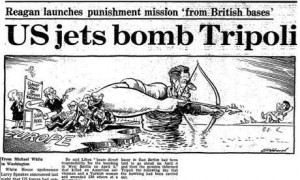
Almost every government in the world condemned the US attack, citing it as a breach of international law; France, Italy, Spain, Russia, China, Iran, the entire African Union, among others, all expressed deep disapproval of the attack on Libya and on Gaddafi’s personal property. Others saw the United States motive as an attempt to eliminate Libya‘s revolution entirely, as opposed to simply retaliating for the Berlin incident. Libyan officials responded by warning that America was trying to establish itself as “the policeman of the world”.
Yet police officials in West Berlin repeatedly told journalists that they knew of no evidence linking Libya to the discotheque bombing.
One week after the attack, Manfred Ganschow, chief of the anti-terrorist police in Berlin, was quoted as having rejected the US government’s verdict that Libya had been responsible for the bomb. Christian Lochte, president of the Hamburg office of the Protection of the Constitution (a domestic intelligence unit) said, just five days after the bombing, “It is a fact that we do not have any hard evidence, let alone proof, to show the blame might unequivocally be placed on Libya… Such hasty blame, regarding the two dreadful attacks at the end of the year on the Vienna and Rome airports, for which Libya had immediately been made responsible, did not prove to be correct.”
A strong suggestion has remained that the Berlin bomb had been set up by the CIA and with the bomber himself having been an Israeli Mossad agent.
The United Nations General Assembly adopted resolution 41/38 which “condemns the military attack… which constitutes a violation of the Charter of the United Nations and of international law.”
A predictably angry (and predictably colourful) Gaddafi said, “Reagan is mad. He is trying to kill me. He is an Israeli dog.” And added, “Thatcher is a murderer…Thatcher is a prostitute. She sold herself to Reagan.”

And then came Lockerbie in 1987.
The Lockerbie bombing was perhaps the 9/11 of its time. While it didn’t result in the kind of phoney Global ‘War on Terror’ that was conducted after 9/11, it did give the US and Britain the platform for beginning a targeted downfall of the Libyan society and system. This was accomplished the same way in Libya as it was accomplished in Iraq: first by years and years of sanctions and forced hardship (via the UN), then by all-out destruction against a nation that is no longer able to defend itself *because of those sanctions* (Iraq in 2003, Libya in 2011).
But of course Scottish investigators never believed in the official verdict concerning the bombing of that Pan-Am flight and in fact revealed that the key piece of evidence – the bomb timer – was planted on the scene by a CIA operative, while the expert who examined the timer admitted to having manufactured it himself and the crucial witness who connected the bomb to the suitcase later admitted to having been paid $2 Million to lie in the trial. Abdel Basset al-Magrahi sat in a prison cell in Scotland for years for a crime he didn’t commit; even when the Scottish government decided to send him back to Libya because of his prostate-cancer, the American and British governments still both objected.
And when Magrahi was filmed receiving a hero’s welcome upon returning home, the Western media was full of condemnation that these people were ‘celebrating a terrorist’. But the Libyan people didn’t see Megrahi as a terrorist – they believed he was an innocent stooge wrongfully imprisoned.
Jim Swire, the spokesman of ‘UK Families Flight 103’, and whose daughter was killed in the Lockerbie bombing, has repeatedly expressed grave doubts about the official version of events. Hans Köchler, the Austrian jurist appointed by the UN to be an independent observer at the Lockerbie trial, expressed concern about the way it was conducted (particularly the suspicious role played by two US Justice Department officials who sat next to the Scottish prosecuting counsel throughout the process and appeared to be giving them instructions). Köchler would later describe al-Megrahi’s conviction as “a spectacular miscarriage of justice”.
Jim Swire, who also was present through the trial, then launched the ‘Justice for Megrahi’ campaign, being utterly unconvinced by the official verdict.
If you still think Lockerbie was the doing of Libya or Gaddafi, see here, here, here, here and here: or read my own article on Lockerbie here.
As if Berlin and Lockerbie weren’t enough, there was also the killing of Yvonne Fletcher in London.
Woman Police Constable (WPC) Yvonne Fletcher was a British policewoman who was shot and killed in London’s St James’s Square during a protest outside the Libyan embassy; it was in 1984. The shooting resulted in a siege at the embassy which lasted for eleven days, as well as the breakdown of diplomatic relations between the United Kingdom and Gaddafi’s Green Libya.
Like Lockerbie, it appears to have been yet another crime was staged to be falsely attributed to Libya and Gaddafi. In 1996, 12 years after the killing, the Channel 4 documentary programme Dispatches, in what was acknowledged by all to have been a massively researched and credible broadcast, cited various credible and experienced sources to conclude that Fletcher had been murdered by elements of British and American intelligence.
Although the mainstream, corporate-owned media observed a complete blackout on the Dispatches story, the issues raised by the programme about the killing of WPC Fletcher were later brought up in Parliament by Tam Dalyell (on the 8th May 1996). Mr Dalyell told Parliament that the programme had been exceptionally well researched and that it had featured statements from people whose calibre and relevant experience was beyond question; this had included a senior ballistics officer in the British Army, Lieutenant Colonel George Styles, and a distinguished Home Office pathologist. Dalyell raised several key issues in relation to the murder of WPC Fletcher, including the fact that the policewoman appeared to have been shot from a different direction than reported, that highly significant discrepancies existed in the pathologist’s reports, and that Fletcher’s fatal injuries could not have been caused by the alleged combination of gun and firing position.
The results of the immediate investigation into Yvonne Fletcher’s murder have never been divulged to the public and have remained one of Britain’s numerous State secrets.
But to highlight how important the shooting of Ms Fletcher was, in 1998, 14 years after her killing, it was still being cited as the sole reason for maintaining trade sanctions against the Socialist Republic of Libya by Jack Straw.
The incident was in fact a major ‘justification’ cited by Margaret Thatcher to support and enable America’s 1986 bombing of Libya (in which some fifty or so Libyan civilians were killed).
I still recall the front-page of Murdoch-owned The Sun newspaper the day after the brutal murder of Gaddafi in 2011;

it showed the bloodied, battered face of Gaddafi and had the words ‘That’s For Lockerbie! And For PC Yvonne Fletcher!’
Gaddafi of course always denied any involvement in Lockerbie or the shooting of WPC Fletcher; and the facts seem to back him up, but of course the corporate media doesn’t care about that.
A curious side-note is that the deputy forward controller at the Libyan People’s Bureau siege at which WPC Yvonne Fletcher was shot was none other than Mr Peter Power; the man most associated with the astonishingly coincidental ‘terror drill’ of the 7/7 London Bombings in 2005.
Lockerbie, Berlin and the shooting of Yvonne Fletcher can all be seen to have been a programs conducted by UK/US intelligence (possibly in concert with agencies from other governments) to permanently vilify Gaddafi’s Libya and justify trying to bring about the country’s decline.
This is an extremely important point: the sanctions imposed on Libya (after Lockerbie) were designed to reverse the country’s success and its attainment of self-sufficiency, to cripple the nation with deprivation and incite ill-feeling towards Gaddafi from within the population (for the purposes of provoking, over time, an insurrectionist element). The only way offered to end the sanctions program was for Libya to pay what was reckoned to be the biggest compensation package ever imposed onto any country – he/Libya would have to pay a total of $10 Billion to the Lockerbie victims’ families.
The other condition was that Gaddafi also had to formally acknowledge responsibility in the UN for his officials’ orchestrating of the Lockerbie bombing. Gaddafi eventually went along with these demands, but to his domestic audience he permanently denied any responsibility or involvement in Lockerbie and told his people that the extortionate reparations Libya was having to pay wasn’t an admission of guilt, but merely the price having to be paid in order for Libya to re-enter the international community.
In 2011, he probably found himself wishing he hadn’t bothered; because it was all for nothing.
The billions of dollars of extortion money the West forced from Libya – for a crime Libya probably hadn’t committed – was quite simply colossal theft/robbery made ‘legitimate’ by the UN (no wonder Gaddafi was so scathing towards the UN in his 2009 address).
What happened in 2011 of course was an even bigger, more outright theft/robbery operation conducted by the criminal government officials and financial institutions in the Western world.
In that context, it’s also hardly surprising that come 2011 and as the Western governments were bombing Libya and trying to kill Gaddafi, the Lockerbie business got dragged out repeatedly in the media to act as timely reminder of why Gaddafi was so terrible and needed to be killed. By this point, the suggestion was now even being made that Gaddafi had ordered the Lockerbie bombing personally (which had never been suggested before).
Like Iraq would soon become too, Libya was an easy scapegoat. Successive American governments maintained sanctions on the Iraqis, causing immense suffering to the population, just as they did in Libya. They also bombed Iraq for sport, even after the 1991 Gulf War. In 1998, while President Bill Clinton was in the middle of his impeachment proceedings for the Monica Lewinsky affair, he randomly ordered US planes to indiscriminately bomb Iraqi cities. There was no reason for it; it was simply a way to look powerful and authoritarian at a time when he was being made fun of domestically.
Libya, like Iraq, had been unjustly bombed too; Reagan’s 1986 attack had no basis in international law and was therefore a crime.

The renowned intellectual and fierce critic of US foreign policy, Noam Chomsky, called Libya an international “punching bag for ten years”, adding that “every time there’s some domestic problem, we bomb Libya, attack Libya; that’s easy, as they’re completely defenseless, nobody’s going to defend them or defend Gaddafi…”
This policy wasn’t just straightforward bullying and persecution or a case of ‘showing them who’s boss’; it was a way to repeatedly damage and cripple the society, interfering with progress and infrastructure.
The 1986 bombings under Reagan may also have been a direct attempt to assassinate Gaddafi.
Those Lockerbie payments were an immense injustice, enforced by the UN (under pressure from the US) and at the cost of the Libyan people and the country’s economy; in essence, the country was robbed of 2.7 billion dollars and the purpose of this policy was to cripple the nation and the government.
Just prior to the events of 2011, Gadaffi was in fact pressuring US, British, French and Italian oil companies to reimburse Libya for the cost of the payments to the families of the Lockerbie bombing – to the tune of 2.7 billion dollars. Gaddafi demanding this reimbursement in 2011 may have been one of the reasons – among many others – that the 2011 ‘intervention’ happened. Renowned whistleblower Susan Lindauer covered Libya at the UN for nine years from 1995 to 2003 and is an expert on Libya and the Libyan people; and this was her view.
She insisted right from the very beginning of the 2011 crisis that it was extremely unlikely that Gaddafi or the government was committing any of the crimes it was being accused of and that it was far likelier that Western governments and corporate interests were simply using the smokescreen of the ‘Arab Spring’ to finally go after Gaddafi and get into Libya.
_________________________
The latter years of the Gaddafi era had seen some significant decline in Libya’s domestic situation compared to the early decades; this, again, was in large part due to the damaging sanctions imposed by America and then the UN from the eighties onwards. Not only was the economic and social toll large and keenly felt by the population; it also effected Gaddafi and his supporters’ ability to properly fulfil their ideological visions.
In effect, from the sanctions onward it is difficult for history to judge whether Gaddafi’s ‘Green Revolution’ and his Libya was a ‘success story’ or not – that is to say, it’s impossible to tell how successful the society would’ve been had it not been forced to endure both the sanctions and the long-standing ‘pariah state’ status and demonisation.
Perversely, it also worth considering that much of Gaddafi’s alleged paranoia and the paranoia displayed by the Revolutionary Committees (which led to much of the oppressive treatment of political opponents) was a direct result of all the CIA/MI6/foreign assassination attempts and plots to subvert, infiltrate or overthrow the regime. If Gaddafi was paranoid, it was probably for good reason. From the moment he’d ousted the monarchy 1969, Gaddafi had numerous and constant threats to both his position and his life – from the monarchists, from the Israeli Mossad, from Saudi and Gulf-State agents, from the CIA and MI6, from home-grown and foreign-backed groups like the National Front for the Salvation of Libya, the National Conference for the Libyan Opposition (NCLO), and finally from Al-Qaeda and the Libyan Islamic Fighting Group. He and his supporters had every cause for extreme defensiveness; all of which of course was proven entirely valid in 2011.
But if the earlier decades after the 1969 revolution were anything to go by, then Libya would’ve continued to be an independent, self-made success story in economic and social terms; as well as more and more of the intended reforms and more manuevering towards more democracy. As it was, the sanctions and the international isolation prevented that from properly happening.
The long-term toll of the sanctions may also have significantly contributed to the pockets of dissatisfaction and unrest in the country that rushed to the surface in 2011; this in fact may have been the purpose of this international policy towards Libya for all those years – to incite/induce anger towards the government from among elements of the population. All of this US-led policy for years, including Lockerbie, was all designed to cripple Gaddafi’s position and to, in international terms, back him and his Green Revolution into a corner.
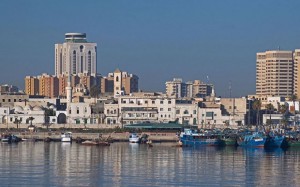
The undisputed success of Libya in that first decade-plus after the 1969 coup simply could not be sustained once the sanctions had been imposed and the billions of dollars in extortion money were enforced.
As Hugh Roberts notes in this article; ‘The hypothesis that Libya, Gaddafi and al-Megrahi were framed is to be taken very seriously indeed. And if it were the case, it would follow that the greatly diminished prospect of reform from 1989 onwards as the regime battened down the hatches to weather international sanctions, the material suffering of the Libyan people during this period, and the aggravation of internal conflict (notably the Islamist terrorist campaign waged by the LIFG between 1995 and 1998) can all in some measure be laid at the West’s door.’
That is exactly the point.
I’ve heard mainstream analysts glibly point out that Gaddafi’s Libya was a ‘failure’. What they’re referring to, however, is those years during the sanctions, while conveniently failing to talk about the years *prior* to the sanctions. The pre-sanctions years are surely a more accurate measure of Gaddafi’s Libya, in which case it would be difficult to overlook the enormous level of development and the great good that was being accomplished.
Using the latter years of the Gaddafi era as the measure of the country would be like using the Great Depression of the 1930s as a measure of whether America is a ‘successful’ society or not.
__________________________
The other key thing Western officials used to vilify Gaddafi and Libya was the ‘State Sponsor of Terrorism’ stigma. This, unlike the Lockerbie and Berlin false-flags, was actually an accusation that had some merit and was based in a degree of truth.
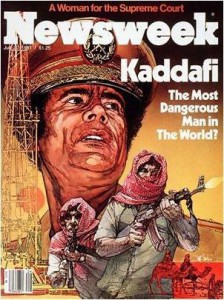
“We know that this Mad Dog of the Middle East has a goal of a World Revolution,” US President Ronald Reagan had famously said in a press conference on 9th April 1986.
That statement in fact became the defining image of Gaddafi and Libya in Western, mainstream perception for the years that followed and remained the defining image right through the 2011 bloodbath. While the reality is that Gaddafi had probably given up on those global revolutionary ideas by the later years of his life, the thought of it was still a cause for ongoing concern. Gaddafi’s Libya had of course been labelled a ‘state sponsor of terrorism’ for many years, and this label had been based largely on his and Libya’s substantial support for such movements as the Palestinian Liberation Organisation (PLO), Nelson Mandela’s ANC, the Sandanistas in Nicaragua, the IRA in Ireland, and various other organisations: organisations that Gaddafi insisted were ‘liberation movements’ and not ‘terrorist’ groups.
Whether he was always correct in that assertion is something we can debate – these labels are subjective and dependent on perspective.
In some cases, he and the Revolutionary Committees were almost certainly misguided and in the wrong, but broadly speaking, there’s plenty of grey area in that subject; for example, it is a fact of history that while almost all Western, ‘civilised’, democratic governments were continuing to support and endorse the Apartheid South-African government, it was Gaddafi and Libya that were openly supporting the ANC and Black South-Africa.
This is why Mandela regarded Gaddafi a friend and a hero (and why he named one of his grandchildren after Gaddafi) and when Western leaders told him not to visit Gaddafi in 1997, Mandela told them to go “jump in a pool”. Mainstream commentators therefore are simply engaged in semantics. Gaddafi always claimed to be entirely against ‘terrorists’; he entirely condemned Al-Qaeda and other Islamist groups (and was in fact the first to do so: that’s a fact), and to be in favour only of ‘legitimate liberation movements’. And many of course would agree that most of the foreign movements he supported – again, the PLO, ANC, or Sandinistas, for example – were indeed genuine liberation movements engaged in struggles for freedom or independence; but again, when it comes to making the distinction between ‘terrorists’ and ‘freedom fighters’, it is always very tricky and we end up mired in semantics.
Mandela himself was once regarded a ‘terrorist’.
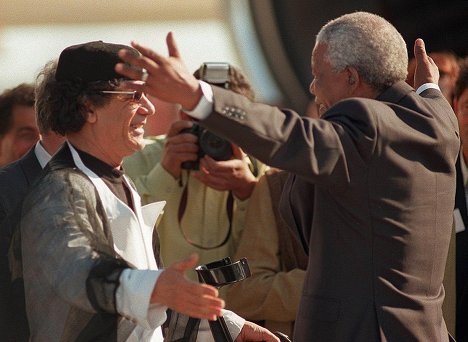
But this was the ‘world revolution’ Reagan was referring to: a world in which oppressed peoples across the globe may have been empowered to rise up and topple their oppressors and systems of control. In the 70s and 80s, Gaddafi was the World’s No.1 sponsor and champion of those causes, from the Aborigines in Australia to the Palestinians choking in the strangle-hold of Zionist Israel.
Whether the movements he was supporting (including the IRA) were always justified ones is another matter – open for debate.
But Gaddafi, it might be said in future decades, may have been the greatest revolutionary figure of the last hundred years.
And even if that threat of ‘World Revolution’ had waned considerably by the time of 2011 (largely due to the economic sanctions), the West never forgave him for those past gestures and remained permanently worried that he might resume his old philosophies.
As for the ‘state sponsor of terrorism’ tag, it’s very much a pot-kettle-black dynamic when we consider that much of the armed warfare NATO and the Western governments were funding and directly supporting in 2011 consisted of Al-Qaeda and various Islamist terror groups. Likewise, with internationally-supported armed jihadists currently fighting in Syria.
One of the most extraordinary things about the international plot to kill Gaddafi and destroy Libya in 2011 was that it was carried out at a time when Gaddafi and Libya were in a process, as mentioned earlier, of reconciliation with the West.
Libya, from the years between approximately 2003 and 2011, was opening itself up again to Western businesses and interests. Embassies were reopened, diplomacy was resumed, and Gaddafi was a key ally of the US in the War on Terror.
In part, this was an act of solidarity after 9/11; Gaddafi and the Libyans wanted to make it clear they were wholly against Al-Qaeda and Islamist terrorism and that they didn’t condone the attacks on American targets. In part, this new era of reconciliation was also about ending Libya’s isolation and trying to recover from the crippling effects of years of sanctions. For these several years, a ‘rapprochement’ occurred between Libya and the West, new business cooperation opened up, and Gaddafi was even invited to America for the first ever time in 2009 and allowed to speak at the UN General Assembly.
Some within Libya were unhappy about this, wondering if Gaddafi had softened from this traditional anti-Western, anti-Colonialist stance, but Gaddafi and the Libyan government was simply being pragmatic and trying to move forward, move away from antagonism and mutual mistrust.
After so many years of demonisation and ‘rogue state’ stigma, Gaddafi and his officials saw it was time for the sanctions to end and for Libya to have some sort of recognition as a legitimate society with a right to exist. It was, however, an uneasy reconciliation on all sides and in fact Gaddafi and Libya were essentially walking into a trap.
Because from that point on, Libya lowered its guard, wrongly believing it was no longer considered an enemy of the West and that it was now among friends in the international community. In truth, the major Western governments never did accept Libya as a ‘friend’, they only saw Libya as a prize that would one day be claimed (what Saif Gaddafi would later call “a McDonalds for NATO”).
It was, with hindsight, only a matter of time before some plot or another would again be hatched to swoop into Libya and make an end of Gaddafi. But no one, not even the most pessimistic Libyan, could’ve imagined that the form this plot would take would be so horrific, so bloody and so diabolical.
While Gaddafi certainly took steps to reconcile with the West and to try to improve relations, he never entirely gave up his anti-Colonial, anti-Imperialist views and ideas. He always retained that same attitude that had driven the 1969 ousting of the King. At the Second Africa/South America Summit in Venezuela in September 2009, he joined Venezuelan President Hugo Chávez in calling for an “anti-imperialist front” across Africa and Latin America, while in his famous and incendiary 2009 address to the UN General Assembly in New York he rallied against the dictatorial powers of the Security Council and the “65 wars” that the UN had failed to prevent. In 2011, he was of course proven 100% correct.
In 2011, an entire list of false accusations were made against the Libyan government and Gaddafi in particular; (1) that they had attacked ‘peaceful civilian protesters’ in February 2011, (2) that the Libyan air-force had bombed residential areas of Tripoli, killing civilians, (3) that the government forces were committing widespread crimes, including rape, (4) that the government had brought in African mercenaries to attack civilian protesters.
Every single one of these were fake stories fabricated by our governments and the corporate media, with absolutely no proof of any of the allegations (a fact that is demonstrated, point by point in this book).
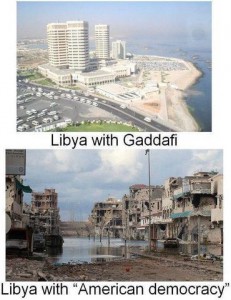
This was all used, of course, to launch a vast bombing campaign targeted to destroy all of the country’s infrastructure – everything it had built up for four decades – and reduce Libya back to the state of a helpless ‘Third World’ nation, just like it had been before 1969.
___________________________
Assassinating Gaddafi had, for that matter, always been on the table too, and long before his actual assassination in 2011.
As far back as 2002, The Guardian was reporting that British intelligence paid large sums of money to an Al-Qaeda sleeper-cell in Libya in an ongoing programme to assassinate Gadaffi in 1996 (the article also portrays how MI6 thwarted early Libyan attempts to bring Osama bin Laden to justice).This revelation centered on the disclosures of David Shayler, the famous MI6 agent who worked on the organisation’s Libya desk in the mid-90s. Shayler was famously sent to prison for his disclosures. During his closing speech in court, he affirmed that he had been gagged from talking about “a crime so heinous” that he felt he’d had no choice but to go to the press. During Shayler’s trial, the then Home Secretary David Blunkett and the Foriegn Secretary Jack Straw had signed Public Interest Immunity documents that banned journalists from being able to report on the plot against Gaddafi.

The MI6 officers involved in the Gaddafi assassination plot were later named as Richard Bartlett and David Watson. According to Shayler, MI6 passed £100,000 to the Al-Qaeda plotters. The plot against Gaddafi was planned for early in 1996. In 1998 Libya released TV footage of the grenade attack on Gaddafi, which they insisted had been carried out by a British agent.
This, with hindsight, reveals not only that a campaign to assassinate Gaddafi was already being worked on over fifteen years before 2011, but also that the British intelligence community’s relationship with the Libyan Islamic Fighting Group, central to the 2011 uprising, also went back to that same time (or earlier): long before the bloody events of 2011. What all of this also confirms is that Gaddafi had been *the* first international leader to issue an arrest warrant for Osama bin Laden.
According to journalists Guillaume Dasquié and Jean-Charles Brisard, an adviser to French President Jacques Chirac, the British and US intelligence agencies buried the fact that this earliest ever arrest warrant for Bin Laden had come from Gaddafi and Libya.
America and Britain refused to take Gaddafi’s side against Al-Qaeda or Bin Laden even at this early time. Five months later, Al-Qaeda killed more than 200 people in the truck bombings of US embassies in Kenya and Tanzania. But then why would the US or the UK be interested in operating against Al-Qaeda – a terrorist group that would prove so useful in the years to come?
And of course the 1986 US attack on Libya was also a direct attempt to assassinate Gaddafi (why else would they bomb his home?). In fact Gaddafi was said to have only survived the attack because the Italians warned him in advance. All eight of Gaddafi’s children, as well as his wife, Safiya, were hospitalized, suffering from shock and various injuries. His 15-month-old adopted daughter, Hana, died several hours after the raid.
This fact that the Americans were trying to murder Gaddafi was confirmed in an article dated February 22nd 1987 and written by the Pulitzer Prize winning journalist Seymour Hersh. ‘The mission, authorized by the White House, was to be the culmination of a five-year clandestine effort by the Reagan Administration to eliminate Qaddafi,’ Hersh wrote. ‘Since early 1981, the CIA had been encouraging and abetting Libyan exile groups and foreign governments, especially those of Egypt and France, in their efforts to stage a coup d’etat – and kill, if necessary – the bizarre Libyan strongman.’
Hersh continued, ‘That the assassination of Qaddafi was the primary goal of the Libyan bombing is a conclusion reached after three months of interviews with more than 70 current and former officials in the White House, the State Department, the Central Intelligence Agency, the National Security Agency and the Pentagon. These sources, a number of whom were closely involved in the planning of the Tripoli raid… depict a White House decision-making process that by early last year was relying on internal manipulation and deceit to shield true policy from the professionals in the State Department and the Pentagon.’
And yet further, ‘The notion of targeting Qaddafi’s family, according to an involved National Security Council aide, originated with several senior C.I.A. officers, who claimed that in Bedouin culture Qaddafi would be diminished as a leader if he could not protect his home. One aide recalls a C.I.A. briefing in which it was argued that ”if you really get at Qaddafi’s house – and by extension, his family – you’ve destroyed an important connection for the people in terms of loyalty.”
Shortly afterward, a C.I.A. operative in Tripoli informed the agency that the Libyan leader had survived but was said to be shaken by the bombing and the injuries to his family.’
Hersh’s in-depth article also reveals that assassination plots were all part of the policy and in fact pre-dated the 1986 attack and its Berlin disco false-flag premise. ‘The CIA,’ wrote Hersh, ‘already knew how difficult a target Qaddafi could be. In late 1981, according to a senior Government official, after Libyan forces returned from Chad, Qaddafi promoted the commander of his successful invasion to general and invited him to his desert headquarters. On the jeep ride, the new general pulled out a revolver and fired point-blank at Qaddafi.‘ The CIA, he quotes an inside source as revealing, was entirely aware of the plot. The would-be assassin, however, missed his target and was killed by Gaddafi’s East-German security guard.
Both British and American Intelligence had, without doubt, been working with Al-Qaeda and other terrorist groups all along, long before 2011. In 2011, however, they simply took advantage of the atmosphere and confusion of the ‘Arab Spring’ in Egypt and Tunisia and used it as the opportunity to arm and unleash an all-out Al-Qaeda-led assault on Libya.
_____________________________
We come then inevitably to the matter of the 2011 phony ‘revolution’.
There had been fundamentalists and extremists in parts of Libya for many years; not as many as in countries like Pakistan, Yemen or Saudi Arabia, but still a significant amount. Extremists had in fact festered for decades in eastern Libya, but were mostly rendered impotent by the Gaddafi government which had zero tolerance for religious fundamentalists or Salafists. In fact many of the ‘brutal regime’ allegations regarding Libya over the years were based on the government’s suppression of militant Islamists and fundamentalists.
By the 1990s the situation was believed to have been well in-hand; however, there may have remained some sleeper cells in parts of the country, biding their time, just as there were in Syria. There may also have been Western intelligence agencies in contact with those sleeper cells for many years, as the David Shayler revelations indicated.
These people, who all had obvious grudges against Gaddafi and an obvious hatred of the secular Libyan state, didn’t take much encouragement to take up arms and wage bloody war.
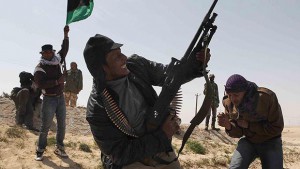
They were aided, of course, by scores and scores of foreign jihadists, Al-Qaeda operatives and former Guantanamo Bay inmates, all sent in in 2011 to act as NATO’s proxy army. These were accompanied, from beginning to end, by CIA personnel, British SAS troops and French and Qatari Intelligence agents.
Unlike say the US, Israel or even Syria, Gaddafi’s approach to dealing with militants and extremists wasn’t solely based on military means; he chose to pursue dialogue. The Gaddafi Charity organisation engaged in dialogue with leaders of these groups, this being both those who’d been in prison in Libya or those returning from illegal activity in Afghanistan, Iraq or from Guantanamo Bay. This dialogue, in part led by the forward-thinking Saif Gaddafi, resulted in leaders of the ‘Libyan Islamic Fighting Group’ and others to renounce violence once and for all.
Following this, several hundred of these militants were released from Libyan prisons over several years, with the promise of having renounced violence and seeking to reform; the final hundred or so of these were released on 15th of February 2011 – just two days before the first violent incidents that sparked off the ‘uprising’.
This progressive attitude, this desire to deal with the problem through rehabilitation, was, with hindsight, one of Gaddafi’s biggest mistakes: many, possibly all, of these released prisoners were involved in the bloody attacks that soon followed. In fact, this policy of trying to ‘rehabilitate’ extremists and release them from prison was all part of a desire to bring an end to the whole ‘brutal regime’ business and move Libya forward: it was the need to suppress exactly these kinds of extremist Salafist/Islamist individuals and groups that was one of the main reasons this harsh treatment of prisoners went on.
But Saif al-Islam had believed that he could remove this extremist problem through rehabilitation and he believed that doing this would negate the need for harsh suppression in the future.
What happened in 2011, where many of these released prisoners and other extremist Islamists ran riot, goaded by Al-Qaeda and aided by NATO, Qatar and the Saudis, demonstrated *exactly why* that harsh suppression had been regarded as necessary for so many years. It’s the irony of ironies.
This point is crucial: even Saif Gaddafi admitted that the Libyan government had been naive in their complacency. Muammar Gaddafi releasing so many Islamists from prison in the hopes of ‘rehabilitation’ and ‘dialogue’ was naivety; but their biggest mistake, Saif told RT during the 2011 crisis, was that they hadn’t bought new, better arms and weapons and didn’t build a bigger army.
Why? Because, as I said a moment ago, Gaddafi and Libya had been lured into a false sense of security and reconciliation by the Western powers. Our leaders demanded Gaddafi’s Libya make itself militarily weak in order to be accepted back into the international community after decades of ostracisation, demonisation and sanctions. Gaddafi was misled into thinking Libya had been accepted as a ‘friend’ of the West in a new era of peace, particularly post-9/11.
This put Libya precisely where America, NATO and the European powers wanted it: weak and defenseless.
“We delayed building a stronger army or buying new weapons,” Saif explained to RT during the 2011 crisis, “because we thought ‘we will not have to fight again’; because the Europeans and the Americans are our friends now.”
But Libya was never really considered ‘a friend’; it was more like an unwitting victim being wined and dined to its doom. In reality, everything Gaddafi and Libya did over a number of years to ‘reconcile’ with the West, everything they did to be accepted again by the international community, left them vulnerable to the attack that NATO and Al-Qaeda launched upon them at the beginning of 2011. The Libyan armed forces were using largely outdated military equipment by this point and once the air-forces of 40 NATO countries were attacking them from the air there was no hope.
Saif himself, who could’ve easily saved himself and stayed out of the affair, chose to go back to Libya to help his father in this time of destructive crisis; he, by this point, was fully aware of the extent to which he had been misled, betrayed and abandoned by his various Western politician friends.

And perhaps Libya‘s biggest strategic mistake was giving up its tentative WMD program several years prior to the uprising. If Libya had developed WMDs, it’s very likely that this criminal NATO/Western/Al-Qaeda intervention wouldn’t have happened, (1) because the international community would not have risked letting its Al-Qaeda proxy army get hold of any such WMD’s in Libya, and (2) because the WMDs would’ve acted as a deterrent, which is precisely the point of owning such weapons.
I’m a pacifist, by the way and I believe all WMDs should be dismantled and given up; however, that only means anything if every government makes the same gesture.
Gaddafi gave up the WMD program as a voluntary gesture of goodwill, firstly to demonstrate to America and Europe that Libya was not a hostile or ‘rogue’ state with ill intentions, and secondly to demonstrate solidarity with America and the West following 9/11. He might’ve morally done the right thing, followed the right path; but he’d made a strategic error that would cost him and Libya dearly.
In a sense this reminded me of something I’d always thought about Saddam Hussein and Iraq; specifically the irony that if Saddam *had* developed WMD’s, it’s questionable whether the US-led invasion of 2003 would’ve happened. The fact that he hadn’t and that America simply said that he had and then went ahead and invaded anyway always seemed tremendously ironic.
One of the reasons Libya had even begun developing a WMD program at all was because the arms embargo placed on them as part of the 1992 sanctions left their country weak and defenseless to attack, as they were unable to buy important military equipment or parts for many years. This was precisely the condition Libya’s armed forces were still in in 2011: and this was precisely the condition the sanctions were designed to place them in.
In that famous BBC/ABC interview in February 2011 when the final crisis was underway, the BBC’s Jeremy Bowen asked Gaddafi if he felt “betrayed” by Western leaders and governments who were now trying to overthrow him. A tired, bitter looking Gaddafi closed his eyes, saying “Of course it’s betrayal. They have no morals.”
But the mistakes were made, and by 2011 the international criminal conspiracy was underway and there was no hope for Gaddafi or Libya.
Under prolonged assault from Al-Qaeda and the various terrorists, criminals and mercenaries on the ground, from NATO and the combined air-forces of 40 First-World nations in the air, and from the world’s corporate media organisations across the propaganda front, Libya of course collapsed, with Gaddafi himself brutally and sadistically murdered by the jihadist mob in Sirte in October 2011.
For the full, exhaustive analysis of the end of Libya and the 2011 international conspiracy, see here.

The job begun by the Reagan administration in 1986 had reached its horrific, inhumane conclusion. Libya was now a wasteland to be fought over by various terrorist groups, mercenary warlords, Western puppet officials and incompetent, incapable, failing ‘rival governments’.
In early May 2012, the Western-backed ‘National Transitional Council’ passed its most sweeping measures, granting immunity to former rebel fighters for any acts committed during the civil war (including, we assume, all murders, unlawful executions, ethnic cleansings, rapes, etc). It also adopted ‘Law 37’, prohibiting the publication of “propaganda” criticising the uprising or questioning the authority of Libya’s new governing organs, or praising Muammar Gaddafi, his family, his government, or the ideas expressed in Gaddafi’s Green Book.
Freedom of expression was not high on the agenda of this supposedly ‘pro-democracy’ movement our governments were so in love with; and Gaddafi’s Green Revolution that had characterised Libya for decades is now illegal to even praise.
And that’s what our governments’ and media called ‘pro democracy’.
Gaddafi’s supporters and those many, many Libyans still loyal to the Green Revolution and the former Libya were ruthlessly persecuted and murdered, continuing to this day. Women’s rights were completely stripped away, ethnic cleansings of Black Libyans were carried out, Christian, Sufi and other minority sects were persecuted and attacked.
The new custodians of Libya’s fate guaranteed favourable business and oil deals to France, Britain, America and the other nations who’d acted as Al-Qaeda’s air-force, and a new Central Bank of Benghazi was established immediately: the first privately-owned, Western-controlled bank in Libya for over forty years, serving to bring the once-independent nation into the dominion of the Rothschild global financial elite and its financial slavery. Mission accomplished.
Former US Congressman and civil rights activist Walter Fauntroy, who went into Libya on a peace mission during the 2011 crisis, reported that “Contrary to what is being reported in the press, from what I heard and observed, more than 90 percent of the Libyan people love Gaddafi.“
Which of course explains why 1.7 million people were said to have marched in Tripoli‘s Green Square on July 3rd 2011 in support of Gaddafi and in opposition to NATO. But they did march: 1.7 million of them came out, in spite of the NATO bombs from the air and the threats from terrorists on the ground, to declare their absolute support for Gaddafi and to demonstrate against the NATO bombings. This was *far* greater a protest in terms of numbers than anything the mythical ‘anti-Gaddafi protestors’ of the corporate media and Western governments could’ve conducted at any stage of the turmoil.
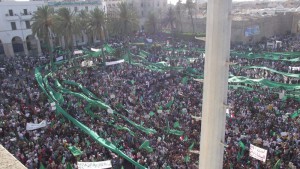
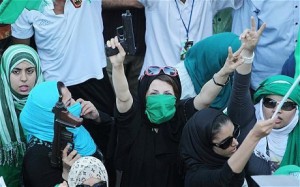
Even *knowing* that the end was near, even *knowing* that the entire international community was closing in to assassinate Gaddafi and even *knowing* by now that the NATO-backed ‘National Transitional Council’ was already being handed control, these 1.7 million Libyan civilians still came out to show their support for Gaddafi and the real Libya: some have argued that this figure in fact represented approximately one-third of the entire population of Libya.
Some international outlets called it ‘the largest demonstration in world history’.
The crowd chanted over and over again ‘We want Qaddafi’ while unveiling a green flag 6 kilometers long. The international mass-media didn’t care; and chose not to show it.
________________________
Even after Gaddafi’s death, however, even after the fall of the old Libya and even in the new climate in which even being a Gaddafi loyalist would be a crime and a life-threatening thing, bitter disillusion came from the mouths of the few Libyan citizens that were ever afforded the chance to speak to the international press. “We lived in democracy under Muammar Gaddafi, he was not a dictator. I lived in freedom, Libyan women had full human rights. We want to live just as we did before,” said Susan Farjan, in this piece in The Telegraph.
An 80 year-old named Mabrouka Farjan said, “Life was good under Gaddafi, we were never afraid.”
“Everyone loves Gaddafi, and we love him because we love Libya. Now the rebels have taken over. We might have to accept that, but Muammar will always be in our hearts,” said the mother of one family.
In fact, the pro-Gaddafi demonstrations even continue to this day, despite it being very dangerous now that Libya has been taken over by Al-Qaeda, LIFG, Ansar al-Sharia, and other terror miltias, including most recently the ‘Islamic State’ terrorists.
Watching some of Gaddafi’s interviews and speeches through the course of the 2011 Civil War made for both compelling and sometimes bittersweet viewing. If you were closely studying the progress of the Libyan crisis as I was (or if you go back now and study the sequence of events, coverage and information), something else you notice vividly is that of all the main players we were shown in the crisis – Gaddafi, the NTC, the rebels, NATO and the Western governments – Gaddafi was the one who came across as being genuinely upset, genuinely heartbroken, at the destruction of Libyan cities and the collapse of Libyan society.
The rebels and their NATO allies on the other hand seemed to revel in the destruction, and the NTC seemed at best indifferent and opportunistic.
That’s because it was Gaddafi who’d built Libya. And how he was watching it all being methodically destroyed by bombers from practically every wealthy, First-World country in the world.
And worse, he knew he couldn’t protest to the outside world, couldn’t explain anything to the world, because all of the major news corporations were involved in the misinformation campaign from the outset.

It is an accepted fact also that Gaddafi, during the 2011 war, had offered at least four separate ceasefires, calling for negotiation and a settlement. He had even offered to go into exile, his only condition being that a small Libyan army presence be allowed to stay in the country in order to prevent Al-Qaeda from taking over: his requests and offers were all flat-out rejected by both NATO and the NTC/rebels. And Al-Qaeda was allowed to take over huge swathes of Libya.
I still vividly remember seeing a report at the time of Gaddafi broadcasting again on state TV, desperately trying to convince the rampaging gangs to stop what they were doing; I remember it so vividly because it was moving.
“If Tripoli is to burn, like Baghdad did… how can you allow this to happen? How can you let Tripoli, which was beautiful and safe… how can you allow it to become a place of destruction and for it to be set alight? This must not happen…”
A televised speech on February 22nd 2011, at the earliest stages of the crisis, had been remarkably prophetic. Gaddafi summed up the true nature of the NATO military intervention. “They don’t care about the future of the Libyan people, or whether Benghazi dies or lives. They are attempting to destroy you and then bring (in) foriegn, colonising powers.”
And concerning the aims of the rebels on the ground, he said predicted, “Women won’t be allowed out. They will transform Libya into an (extremist) Islamic Emirate and America will bomb the country under the pretext of fighting terrorism. They will turn Libya into another Afghanistan, another Somalia, another Iraq…”
_________________________
The original Libyan Revolution led by Gaddafi that successfully ousted King Idris in 1969 was an entirely bloodless coup with no deaths and no violence; it had been conducted with popular consent and broad support and carried out entirely by Libyan nationals serving a Libyan agenda.
It had been entirely secular in character, with no sectarian interests.
Contrast this to the foreign-funded 2011 uprising, which involved scores and scores of foreign terrorists and mercenaries and was backed and directly aided by foreign interference and foreign military bombing; it was an absolute bloodbath, mired in Islamist terrorism, Al-Qaeda atrocities, ethnic cleansings, and unbridled barbarity in many instances.
And the tree is judged by its fruit: the 1969 coup led almost immediately to the most prosperous, astonishing era of growth any African nation has ever seen, with an accompanying outbreak of national unity and pride. The 2011 phoney revolution has led to absolutely nothing; just more bloodshed and warring factions, daily assassinations, mass killings and utter chaos – and *still no national government* even four years later, and certainly no unity or pride.
In conclusion, we have to reiterate that it is ultimately impossible to judge Gaddafi’s Libya in any accurate way, because the Western interference via the sanctions and demonisation set the country back decades.
The only fair way to judge this Libya is by judging it on the years where they *weren’t* under the crippling sanctions; in which case, we can only conclude that Gaddafi’s great revolution was a success.
Those first 10 – 15 years after the 1969 coup saw unprecedented development, a degree of economic, social and infrastructure growth unparalleled in Africa, and the attainment of a quality of life that made Libya the envy not just of Africa but of much of the world.
The fact that all of this was accomplished without foreign aid, without the IMF or World Bank, without incurring any debt, is all the more extraordinary. Tingba Muhammad, in an article in The Final Call, described Gaddafi as ‘a man whose progressive record of accomplishments very well may be unmatched by anyone who has ever led a nation in modern times.’
We can now only imagine what Libya could have been had the sanctions not been imposed; and further, what it could have been had the 2011 criminal conspiracy not been conducted. The reconciliation with the West that had been occurring, along with Gaddafi’s further and further reforms and perhaps most of all Saif al-Islam’s long-term agenda for a more orthodox democratisation of the country, could’ve all led to an even more comprehensive success story for Libya.
The fact that it wasn’t allowed to happen suggests that powerful parties and institutions didn’t want it to happen.
Libya is gone. The real Libya, that is.
Whoever emerges as the future ‘recognised’ government of Libya (a question still not resolved even in 2015), it is hard to imagine, examining the post-apocalyptic Libya of today, that any kind of national unity or prosperity will be attained for generations.
This is the great, supreme irony, of course: that the real ‘Libyan Revolution – the one that Gaddafi led four decades ago – was ultimately brought to an end by a phony ‘revolution’ launched by NATO and the foreign-funded Islamists and terrorists to undo those four decades of work and take away from Libya what it had attained.
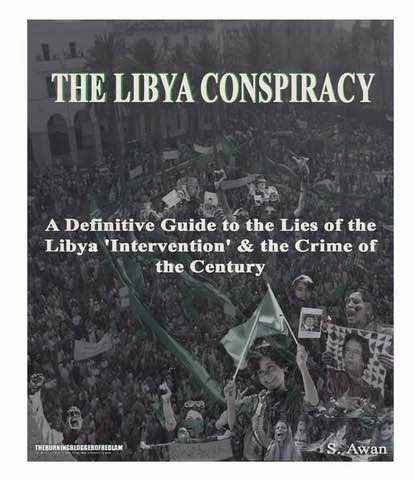

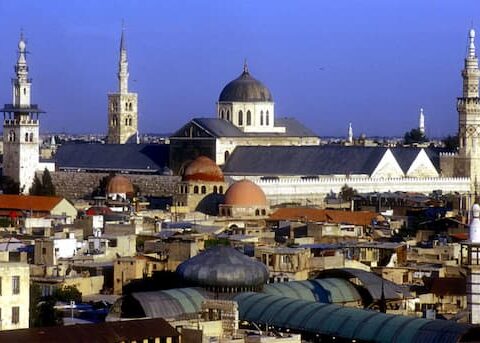
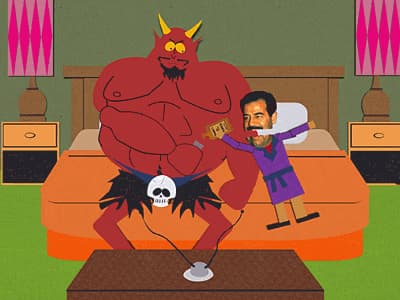

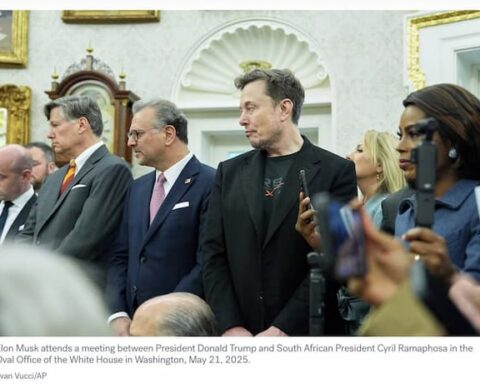
Reblogged this on unbiasedsyndicate.
Is this the BBC-documentary you’re missing: https://www.youtube.com/watch?v=GBYoVFhr6SM
Thanks, Lars; I think this is the one. I couldn’t find it in 2011; I guess someone’s managed to re-upload parts of it.
Enlightening article. Direct Democracy does seem to make more sense. People voting directly instead of through a representative. Pity it was stopped there and not allowed to grow outside. It might have solved a lot of the world’s problems.
Thanks Saine13. I do tend to wonder how different policy would be if the people got to vote on all kinds of specific issues and legislation, instead of only being allowed to vote every four years and only to vote on who represents them.
Yes. It would be interesting to find out. So many don’t bother to vote because of disillusionment.
Thank-you for this … it clears up a lot for me. It also makes me worry about the current rapprochements between the US and Cuba/Iran?
Thanks, NP. I was working quite a long time on this one. I’ve also actually written a book on the 2011 Libya intervention, which I’m going to – at least for a month or so – make available on this blog as a free download shortly.
As for Cuba and Iran, yes, that thought had crossed my mind too. I feel like in both cases, Obama has genuinely been trying build bridges and resolve old hostilities. The problem is that people and cabals within Washington probably don’t intend to stick to his initiatives in the long-run. They’ve already said openly that once he’s gone, they don’t intend to honour agreements with Iran.
What’s interesting as well is that Saif Gaddafi, during the 2011 crisis, actually told RT that representatives from Iran had warned the Gaddafi government not to give up their weapons programme, not to scale down their armed forces and basically not to trust the ‘rapproachment’ with the European and American governments. But Saif himself admitted he’d been extremely naive in his dealings with Western politicians and organisations and in thinking that people like Nicolas Sarkozy and Tony Blair were his ‘friends’.
Saif’s girlfriend has actually asked Tony Blair to intercede or say something on his behalf – in his role as Middle East Peace Envoy. But Blair, so far, has said nothing; and Saif is currently sentenced to ‘death by firing squad’.
There is a massive amount of work and research in this article. Words fail to express how good it is. Will try to post and tweet everywhere.
Thanks so much, Sand49 – both for the kind acknowledgement and for sharing it out on your networks. Much appreciated.